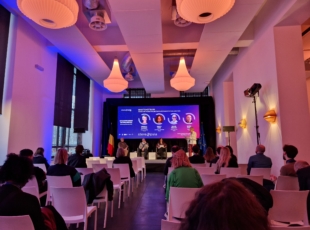Itch.io, the ethical oddball in the midst of gaming platforms

Article author :
Created in 2013 by just one person, itch.io rapidly established itself as the unmissable platform for independent video games and alternative creative projects. This unique sharing site, which stands out due to its flexibility and community engagement, has succeeded in appealing to developers the world over, including Belgian talents.
Itch.io is first and foremost an enigmatic name. An internet address, to be exact, as short as it is mysterious. And once you have ratified it in your navigation bar, the platform you land on is both compelling and surprising. It has to be said that itch.io stands out immediately for its pared down interface, far removed from the overloaded portals of the sector’s giants, highlighting the content rather than complex functionalities. In terms of content, you enter a singular universe: the miniatures of the games offered are sometimes dark, sometimes ultra-coloured, occasionally very inspired, but often completely struck out.
Itch.io is one person’s brainchild: that of Leaf Corcoran, an American amateur developer. His ambition, to create a platform which could host the creations of budding developers who, like himself, simply wished to share their unpretentious video games. Nevertheless, in 2014, one of his creations exploded the internet. This game is Flappy Bird. Whilst ultra-simple in its operating schema – you steer a small bird and activate its wings to have it pass between obstacles – Flappy Bird became a global success story, attracting thousands of people to itch.io. On visiting the site, many of them were drawn in by the minimalist approach, quite motley, and the very unusual experiences hosted on the platform.
Over time, it is incidentally a genuine fully-fledged community which has chosen to take up residence at itch.io. Users who were no longer looking to simply play, but to discover works which went beyond the habitual models of gaming, offering innovation, creativity and a certain artistic audacity.
A fair approach to the creators
Another point which has intensified the loyalty of this community is the ethical and flexible approach itch.io adopts with creators. Whereas Steam inflicts a 30% commission on sales and where Epic Games Store hovers around 12% , with a particularly strict selection policy, itch.io offers adjustable revenue sharing. Creators can therefore decide the percentage to transfer to the platform, a unique feature which offers them unparalleled liberty and allows them to express themselves however they see fit.
But that is not all. Itch.io also permits developers to set their own prices, to offer their works in a ‘pay what you want’ option or even to distribute their creations free-of-charge. This pricing freedom goes hand in hand with a complete personalisation of the pages, offering creators a space which they can model in their own image, without (or almost) restrictions, and without rigid guidelines.
The platform’s accessibility is also a major asset. Publishing on itch.io does not require going through long and complex processes. Any creator, be they a novice or a seasoned operator, may submit their project without hindrance. Furthermore, the platform actively supports games in development, allowing creatives to publish versions in early access mode or, alternatively, put out prototypes to raise funds or garner constructive feedback.
A haven for charitable initiatives
Besides its liberty of distribution, itch.io has above all gained greater visibility in recent years for its engagement with charitable initiatives. The platform has proved capable of mobilising its community around important causes, often with spectacular results. In 2020, the ‘Bundle for Racial Justice and Equality’, a set of games purchasable in one go, gathered over 1,700 games and creative products, generating over 8 million dollars to support social justice organisations. This colossal initiative, unheard of in the video game domain, has demonstrated the platform’s ability to unite creatives around shared values.
Itch.io has also proved capable of rapidly adopting a position in the context of international crises, as in 2022 with the ‘Bundle for Ukraine’, organised in reaction to the Russian invasion. This bundle mobilised thousands of creatives to raise funds for humanitarian organisations, demonstrating once again its effectiveness in the rapid activation of its community for global causes.
Another of the platform’s striking unique features is the diversity of the charity bundles offered. The causes supported range from humanitarian aid and social justice to taking in support for LGBTQ+ rights. The broad and open participation in these initiatives permits the inclusion of very varied games, from recognised titles to experimental projects, which once again enhances the idea of a unified and engaged community.
Finally, the ‘pay what you want’ pricing model promoted by the platform turns out to be particularly effective in these contexts. It encourages buyers to contribute more, often well over the minimum prices suggested. This generosity, backed by a total transparency concerning the gifts donated, has enabled itch.io to establish a reputation for trustworthiness and integrity in the organisation of such campaigns.
Belgian pearls to discover on the platform
Itch.io offers games from every background and from every country. The platform has thus also naturally established itself as a privileged site of expression for Belgian talents. Amongst the notable Belgian creations published on the platform can be discovered Lieve Oma by Florian Veltman. This narrative and introspective game invites players for a stroll in the woods with the grandmother of the main character, sensitively exploring universal themes such as memory and family relationships. Praised for its simplicity and its soothing ambiance, Lieve Oma is a perfect example of the artistic sensibility to be found on itch.io.
Another project to be highlighted is When the Past Was Around by Mojiken Studio. Even though it emerged from an Indonesian studio, it has benefited from the contribution of Belgian artists. This point-and-click adventure game, centred on love, loss and the discovery of self, has captivated numerous players with its striking visual style and its bewitching soundtrack. Itch.io has enabled this project to deeply affect an audience sensitive to narrative and emotional experiences.
Finally, Death Trash, developed by Crafting Legends, with significant support from the Belgian community, is a post-apocalyptic RPG blending punk aesthetics and immersive gameplay. This game, with a pixelated artistic style and a raw universe, has found a place in the hearts of fans of independent games thanks to its originality and its engagement.
Three Belgian examples which illustrate the diversity very well offered by itch.io. But besides the quality of the works offered, what we here at kingkong particularly appreciate is the totally subversive aspect which the platform has adopted to get things moving in a positive way!
A story, projects or an idea to share?
Suggest your content on kingkong.





